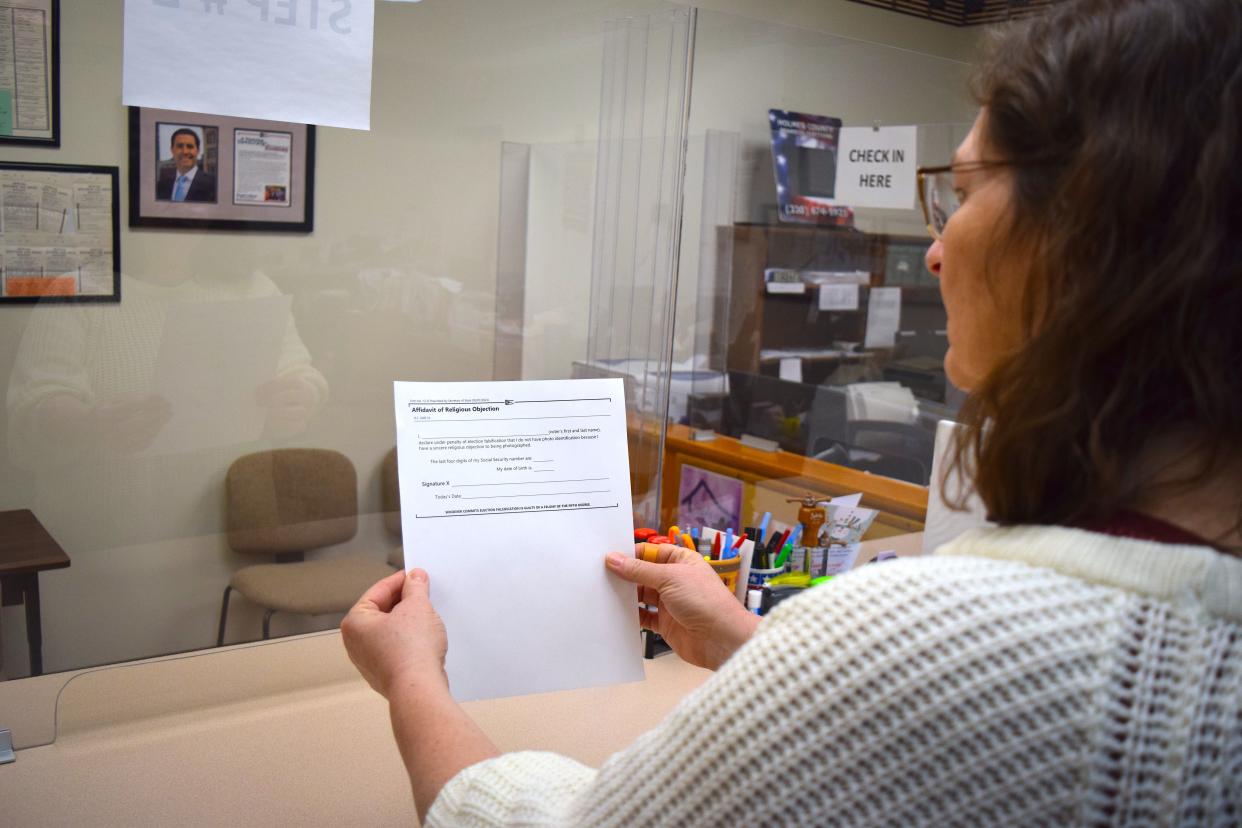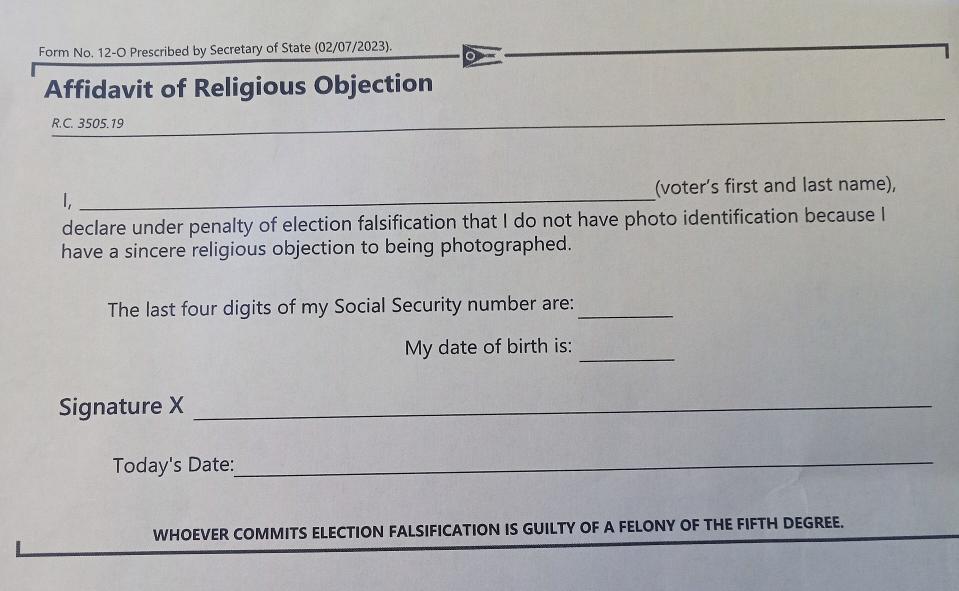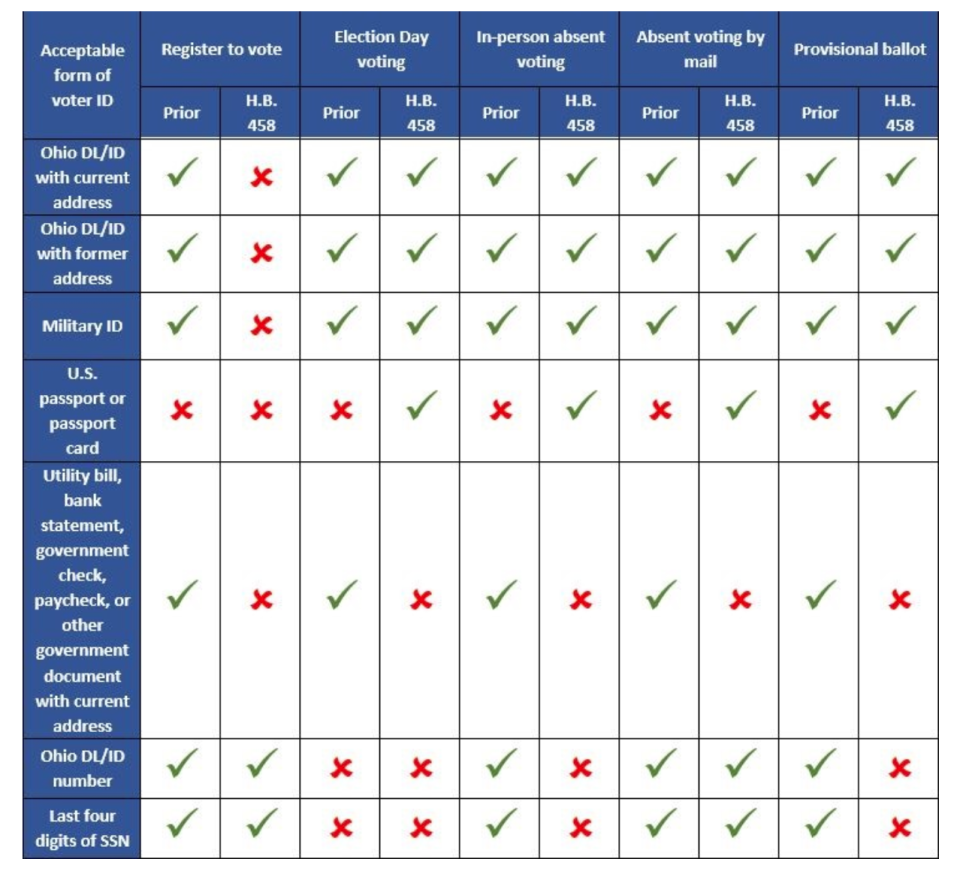2023 May primary: Will Ohio's new photo ID requirement impact Amish voters?

MILLERSBURG − As Ohio’s primary approaches, a strict new photo ID requirement is stirring concerns among older voters, military veterans, out-of-state college students and in Amish communities, such as Holmes County.
Commissioner Joe Miller wonders about the impact of House Bill 458, which was designed to respond to conservative voters unsettled by unfounded claims of widespread fraud and persistent conspiracy theories over the accuracy of U.S. elections.
"We've got about 20,000 Amish people in our community and more and more are voting," Miller said. "A third of our voters are Amish, and we want to get more and more of them registered."
Road safety in Amish Country: Buggy, bikes lanes, new trails sought for Wayne, Holmes counties
According to a story from the Associated Press, of the 35 states that request or require a photo ID to vote, Ohio is now the ninth Republican-controlled state to move to a strict law allowing few to no alternatives.
The change adds passports as valid ID, but eliminates nonphoto documentation such as a bank statement, government check or utility bill for registration and in-person voting. Military IDs also are no longer acceptable when registering to vote.
With nearly one-third of the 18,072 registered Holmes County voters being Amish (based on estimates from the 2020 Amish Directory that is published every five years), Miller believes voting may be more difficult for many locals, particularly Amish sects that stand against having their pictures taken.
However, according to Wayne Wengerd, an Amish man who serves as director of the Ohio Steering Committee, he has not had any reports from within the Amish communities of Holmes and Wayne counties of potential problems with the new law. Wengerd does not believe it will be a problem.
Wendy Weiser, vice president for democracy at the Brennan Center for Justice, said the new Ohio law undercuts the Republican narrative about the state having a record of clean and well-run elections.
“Ohio election officials have long been adamant that this wasn’t needed, that Ohio had a good system for vetting and rooting out any fraud and the proof was in the pudding,” she said.
Republican state Sen. Theresa Gavarone, a supporter of the law, said the change will make it harder to cheat.
It already has led to frustration and confusion, in part because of the fast-approaching state primary on May 2.
Republican Secretary of State Frank LaRose ordered counties to begin implementing the fast-tracked law so it would be in effect for the primary, though its start date falls within the early voting period. Waiting until fall, LaRose said, “would result in a clear violation of Ohio law.”
What happens at the polls if voters don't have a photo ID?

According to LaRose's office, if a voter does not have a photo ID because of a religious objection to being photographed, the precinct election official or board staff must provide a state form.
Rob Nichols, communications officer, explained an Amish voter would fill out the Affidavit of Religious Objection form, including their name, signature and last four digits of their Social Security number.
The elections board will then check with the Bureau of Motor Vehicles to make sure the voter does not have a photo ID. The vote is cast provisionally, and once there is confirmation of no photo ID, the vote is counted.
"That all happens in the few days after Election Day," Nichols said. "A little wrinkle, in that early voting starts Apr. 4, and the free ID that will be offered by the state does not go online until April 7, so a voter can't get a free photo ID for the first three days.
"Starting April 7, anyone (without a driver's license) can go into their BMV and get their free state ID; and if they have a religious exemption to their photo being taken, they can get one without their photo on it, and that can be used to vote or to register to vote. There is a path for whatever they choose."
Meanwhile, a legal challenge to the law by a Democratic law firm remains unresolved. The lawsuit alleges the law creates “needless discriminatory burdens,” including by requiring photo IDs, making it harder to correct minor mistakes on ballots and restricting mail balloting.
Veterans’ organizations and county recorders, particularly in the populous, Democratic-leaning counties that include Columbus, Cleveland and Cincinnati, have been vocal about the law excluding county-issued veteran photo IDs, though it does allow military IDs, to vote. They cost less and are valid longer — 10 years — than a driver’s license.
“People find reasons to fix something that doesn’t need to be fixed,” said Larry Anderson, 85, a veteran from Columbus who has found the veteran ID card a convenience. “Veterans could come back from the wars and not have a driver’s license and not drive a car, and it just creates more problems for them.”

Concerns about the impact on Election Day
Lindsey Bohrer, assistant director of communications for the Ohio Department of Public Safety, said her office is in constant communication with groups from Amish communities to help keep them updated on requirements to obtain a state identification card.
"We work with a central member of the community who disseminates forms and materials to the regional churches," Bohrer said.
Even though supporters of House Bill 456 say the religious exception affidavit will be easy to use, Holmes County Board of Elections Director Lisa Welch is worried that confusion and extra paperwork could add to the workloads of already stressed boards of elections.
“My biggest concern is the first time through, we get a whole bunch of provisionals (that must be processed separately later),” she said. “I’m the only full-time person in the office right now, and we can’t do everything.”
Miller fears the new process could deter some voters.
“I want honest voting, I understand that, but a lot of the Amish don’t have the photo ID and won’t do a photo ID,” he said. “So what the Amish do usually — they’re pacifists, they don’t fight anybody — they just walk away.”
Welch expects delays if there is an influx of provisional ballots this election.
"If a voter comes into a polling place, and you've got everybody flowing through the line, and all of a sudden you've got stop for a provisional, it kind of slows the line down," she said. "They've got to move over to the side, then the poll workers have to take the person back in once they've completed the form."
The elections board also has to handle that ballot, scan it, enter the data into the computer and verify them.
"It takes a lot more work to do a provisional ballot, as far as hands-on, than an absentee ballot," Welch said. "If we can get more people to use absentee ballots, that would be the simplest way to solve this problem."
Welch noted Holmes County generally has between 30 and 50 provisional ballots during a typical election, with around 150 for a presidential election. She expects the new law will create at least 200 or more.
"I think it will get better as time goes on, because if people get the state ID and are using the absentee ballots, we won't have to worry so much about the provisionals," Welch said. "We're kind of behind the eight ball because first of all, we don't know how many provisional envelope supplies to have available at each voting precinct."
The Associated Press contributed to this article.
This article originally appeared on The Daily Record: New voter ID law in Ohio could impact Amish voters

